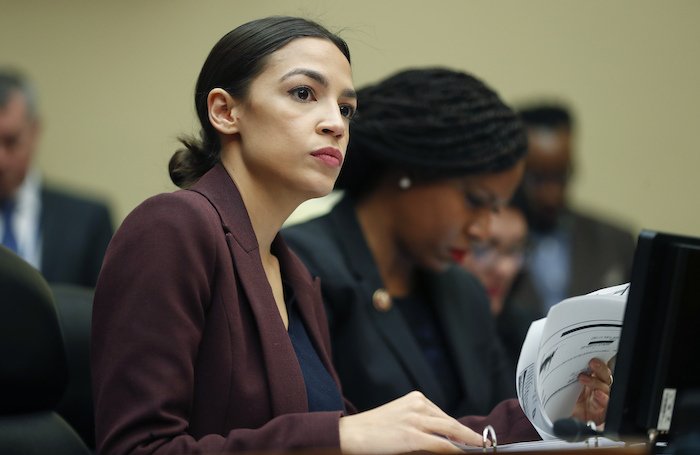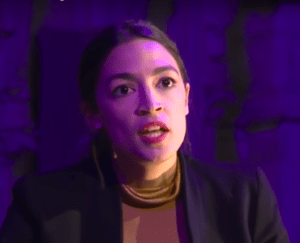Truthdigger Alexandria Ocasio-Cortez, the New Face of the Democratic Party
The youngest member of Congress in history has been in office under two months, but she’s already done plenty to praise. Rep. Alexandria Ocasio-Cortez during testimony by Michael Cohen, President Trump's former lawyer, before the House Oversight and Reform Committee on Capitol Hill on Wednesday. To her right is Rep. Ayanna Pressley. (Pablo Martinez Monsivais / AP)
Rep. Alexandria Ocasio-Cortez during testimony by Michael Cohen, President Trump's former lawyer, before the House Oversight and Reform Committee on Capitol Hill on Wednesday. To her right is Rep. Ayanna Pressley. (Pablo Martinez Monsivais / AP)
Despite her short career in politics, there’s already a lot to praise about Alexandria Ocasio-Cortez. Rising to fame by unseating Democratic heavyweight Joe Crowley in a shocking primary upset last year, the freshman representative from New York’s 14th District has scarcely been out of the limelight since. Even before she won the 2020 midterm election, she began to garner fame as the new face of the Democratic Party, much to the discomfort of some political elites: Young, female, queer, Latinx, democratic socialist—“New party, who dis?” indeed.
The 29-year-old campaigned on a progressive agenda shaped during her stint as an organizer in Bernie Sanders’ historic 2016 primary challenge, a campaign that ended up winning her a seat in Congress as the youngest member in U.S. history. She’s made Medicare-for-all, tuition-free college and other progressive goals the tenets of her tenure from the get-go, making good on her promise to fight for “a modern, moral … Society [in which] no American [is] too poor to live.” Ocasio-Cortez has also been getting under the skin of both the Republican and Democratic establishments with her fierce determination to stick to her left-leaning principles despite a constant barrage of criticism from all sides. It is likely her staunch sense of purpose that has led her to become one of the most influential politicians in the U.S., with Democratic presidential hopefuls already vying for her endorsement in the 2020 race.
Her social media presence has not only made her relatable to millennials and others, it has helped drag Democrats—many who are quite literally taking lessons from the freshman—kicking and screaming into the 21st-century political playing field President Trump has been using to his advantage for years. Social media, especially Twitter, is also where Ocasio-Cortez has been able to promote and defend her agenda, and with 3.33 million followers and counting, her reach shouldn’t be underestimated, particularly since the media seemingly can’t stop hanging on her every word. Regarding the frequent comparison to Trump’s use of Twitter, one Congress member said in a wide-ranging interview with Rolling Stone:
Well, I think that there’s this rush to make that comparison, but any time media fundamentally changes, the first movers to recognize that change — and to learn it and to adapt to it — tend to have that first-move advantage. So this is less about personality, less about Trump, and more about who has had the first-mover advantage. But there are similarities. People who succeed in social media follow similar tenets. In order to resonate with people, you have to tell them what you mean, you have to be willing to make mistakes, you have to be willing to be vulnerable and learn as you go.
As a millennial, Latinx, feminist progressive myself, I’m nothing short of ecstatic to see someone from a similar background make such impressive political gains. It’s made all those memories of growing up being told any of us could be president suddenly feel less like a lie and more like reality-in-the-making. As a child, I did not have anyone like Ocasio-Cortez to look up to in the primarily white male sea of politicians on C-SPAN, and it’s incredibly moving to know that will no longer be the case for Latinx American kids. Representation—in every sense of the word—matters immensely, and the House representative has already made history by being undeniably herself.
While AOC, as she’s known, even has a comic book hero modeled after her now, her crowning achievement has no doubt been the drafting of the Green New Deal, which she introduced alongside Sen. Ed Markey of Massachusetts on Feb. 7. “The most visionary resolution to emerge from Congress in recent years,” writes Truthdig’s Sonali Kolhatkar, “encompassing both the climate crisis and economic inequality, has captured the imagination of many Americans.” The plan, which unites climate change concerns with a jobs guarantee, could change the nation’s course toward a greener, more equal and prosperous future at a time when the Trump administration is leading us in the opposite direction.
In a recent column, Truthdig’s Ellen Brown explains why Ocasio-Cortez’s plan to fund the ambitious deal isn’t pie in the sky, but rather a sound economic proposal with plenty of historical data behind it:
Ocasio-Cortez and the 22 representatives joining her in calling for a select committee also are proposing a novel way to fund the program, one that could actually work. The resolution says funding will come primarily from the federal government, “using a combination of the Federal Reserve, a new public bank or system of regional and specialized public banks, public venture funds and such other vehicles or structures that the select committee deems appropriate, in order to ensure that interest and other investment returns generated from public investments made in connection with the Plan will be returned to the treasury, reduce taxpayer burden and allow for more investment.”
A network of public banks could fund the Green New Deal in the same way President Franklin Roosevelt funded the original New Deal. At a time when the banks were bankrupt, he used the publicly owned Reconstruction Finance Corp. as a public infrastructure bank. The Federal Reserve could also fund any program Congress wanted, if mandated to do so. Congress wrote the Federal Reserve Act and can amend it. Or the Treasury itself could do it, without the need to even change any laws. The Constitution authorizes Congress to “coin money” and “regulate the value thereof,” and that power has been delegated to the Treasury. It could mint a few trillion-dollar platinum coins, put them in its bank account and start writing checks against them. What stops legislators from exercising those constitutional powers is simply that “everyone knows” Zimbabwe-style hyperinflation will result. But will it? Compelling historical precedent shows that this need not be the case.
Republicans, including the president’s daughter, Ivanka Trump, have been quick to criticize the jobs guarantee element of the Green New Deal. Ocasio-Cortez has responded by using her experiences as a low-wage-earning server to highlight the personal experiences that have informed her push for better-paid work. After being lauded for her questioning of Trump attorney Michael Cohen during Wednesday’s House Oversight and Reform Committee hearing, Ocasio-Cortez again referred to her working-class background:
Thanks!
Bartending + waitressing (especially in NYC) means you talk to 1000s of people over the years. Forces you to get great at reading people + hones a razor-sharp BS detector.
Just goes to show that what some consider to be “unskilled labor” can actually be anything but ? https://t.co/pcVKe5XKdm
— Alexandria Ocasio-Cortez (@AOC) February 28, 2019
She seems determined to remember her roots, and, more importantly, use them as the foundation for policies that will work for the majority of Americans, not the elite few who have made their fortunes off the backs of the most vulnerable members of our society. To say she is the breath of fresh green air the Democratic Party desperately needs is an understatement.
For her progressive, feminist and courageous work, which we hope she’ll keep up, Alexandria Ocasio-Cortez is our Truthdigger of the Month.
Your support matters…Independent journalism is under threat and overshadowed by heavily funded mainstream media.
You can help level the playing field. Become a member.
Your tax-deductible contribution keeps us digging beneath the headlines to give you thought-provoking, investigative reporting and analysis that unearths what's really happening- without compromise.
Give today to support our courageous, independent journalists.









You need to be a supporter to comment.
There are currently no responses to this article.
Be the first to respond.